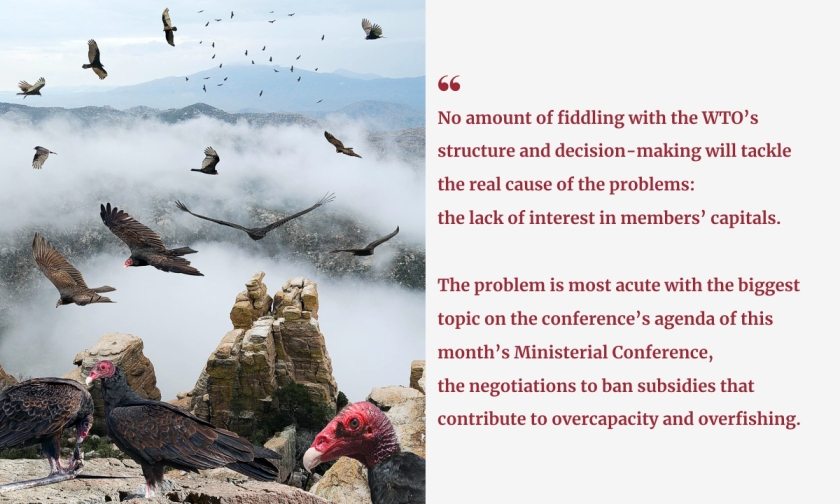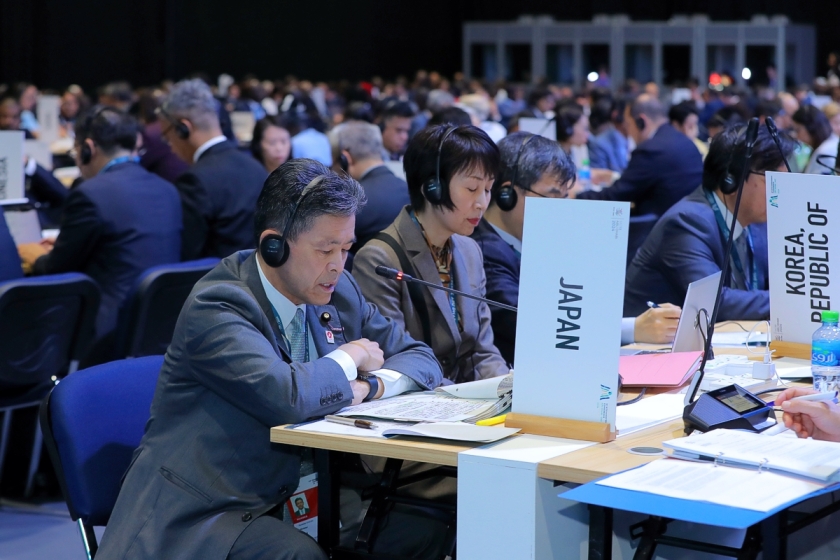SEE ALSO
The issues: Definitely. Maybe. Unlikely. Who knows? Issues on the WTO conference agenda
By Peter Ungphakorn and Robert Wolfe
POSTED FEBRUARY 21, 2024 | UPDATED FEBRUARY 27, 2024
The cynics are circling the World Trade Organization’s upcoming Ministerial Conference with doom-laden prophecies that the “WTO” is likely to fail, again.
The cans that were kicked down the road in Geneva in 2022 are now supposed to produce content in Abu Dhabi in 2024. The prospects of that are sobering.
But the WTO is not just its Ministerial Conferences, and the purpose of these conferences is not merely concluding new agreements. Given the challenging circumstances, system preservation may be the most important outcome.
CONTINUE READING or JUMP TO
Do no harm | Reforming WTO work | The system in jeopardy | Preserving by talking
As we noted in our piece on the agenda of the February 26–29 conference in Abu Dhabi, India and the US are two large but stubborn members who may ensure that this time WTO trade ministers will be forced to kick dozens of cans down the road once again.
India is stubborn on agriculture and several other issues even when a large majority of WTO members have a different view (such as the moratorium on e-commerce tariffs and on investment facilitation). The US is more quietly defying a majority of members on appeals in WTO dispute settlement. And yet both have been engaging actively in a wide range of WTO activities.
We have previously worried that the attention of trade ministers was “elsewhere”. It still is, and if anything the distractions are worse. The WTO is just not a priority. And that affects the possibility of anything substantial happening in Abu Dhabi.
Consider the present context. This year will see elections in both the US and India (where farmers have been protesting), as well as the EU and some other countries. In many of them scepticism about trade and multilateralism dominate. In the US an unenthusiastic Joe Biden faces a WTO-hostile Donald Trump. The Modi government in India probably sees defying “the WTO” as a vote-winner.
We should not be surprised by any of that. Nor should we be too dismayed when no multilateral body is able to achieve much. Kicking cans down the road with new deadlines and further work programmes could be a good outcome. It would ensure that WTO delegations are ready when the stars align again for action in Geneva.

Do no harm
What does preserving the system require? As the US Chamber of Commerce put it, first do no harm.
Agreeing, as was first suggested, that there is no progress to be made on extending the COVID-19 patent waiver from vaccines to tests and treatments would have been an example of doing no harm.
But this was too much to stomach for countries pushing for the extension, so instead, members simply state that they disagree, leaving open the prospect of more hours wasted in endless, repetitive and futile debate. Institutionally, that’s still not much harm other than a waste of time and resources.
Avoiding watering down existing commitments in agriculture would also do no harm, as would ministers approving routine reports from committees. Maintaining the e-commerce moratorium would count (but it’s still touch-and-go), even if doing anything new on digital trade rules is out of reach.
The draft ministerial decision on agriculture is five detailed pages of can-kicking. Almost everything would be pushed back to the conference after this one (“MC14”), in about two years’ time, but with some guidance on priorities and work programs for seven knotty issues. That would also do no harm.
Where there is a risk of harm is the controversy over one issue. This is the stand-off on whether over-the-limit price support used to procure food security stocks (misleadingly shortened to “public stockholding”) should be decided separately at this Ministerial Conference or pushed back with the rest of agriculture to the next one
It is between the G33 (which includes India), and the African and African-Caribbean-Pacific groups, versus most of the Cairns Group (Australia, New Zealand, Canada, Brazil, Costa Rica, etc) plus the US and the EU .
The deadlock could wreck the whole Ministerial Conference, or at least to leave it without anything on agriculture, as happened in 2022.
Reforming WTO work
WTO reform means new approaches to major issues facing the trading system, including how to add new issues to the agenda, and fixing the machinery to ensure that WTO functions well in its routine tasks.
Under this heading, next for system preservation would be for the ministers to endorse the efforts of all WTO councils and committees to reform their working practices and to encourage them to go farther in adopting new digital tools — to fix the machinery so the routine tasks work better.
This “reform by doing” would enable all members to participate more effectively and inclusively in WTO work
It would strengthen the WTO’s vital role in making trade policy developments more transparent both for members and for stakeholders.
Reform also means fixing the machinery so that every WTO council and committee is more effective in delivering the mandated objectives of its routine work.
What that involves sounds simple. It includes planning meetings better, circulating agendas with explanatory notes, improving databases and other digital tools, and reporting discussions more quickly.
But they are actually complicated because of the people who work on various WTO councils and committees are diverse, including officials and agencies in members’ capitals.
For these areas of reform, the Ministerial Conference’s role is merely to endorse the extensive work that has been done and encourage further efforts especially in the WTO committees that have made less progress.
The other institutional reform that would contribute to system preservation is fixing dispute settlement, although there is no chance of an agreement on dispute settlement at this Ministerial Conference so system preservation would require ministers to tell their ambassadors to carry on, instead of abandoning all hope.

The system in jeopardy
WTO reform as a subject receives a lot of attention because “the WTO” is seen to be failing in many if not all its functions. However, no amount of fiddling with the WTO’s structure and decision-making will tackle the real cause of the problems: the lack of interest in members’ capitals.
The problem is most acute with the biggest topic on the conference’s agenda of this month’s Ministerial Conference, the negotiations to ban subsidies that contribute to overcapacity and overfishing — the missing piece from the 2022 Fisheries Subsidies agreement.
The chances of agreement at this Ministerial Conference are somewhere between slim and in the balance, as members don’t seem to have settled enough of their differences to leave ministers with a manageably small number of knots to untie.
Failure will worsen the WTO’s reputation. Over-fishing is a problem for everyone. It’s even a problem for landlocked countries that consume seafood. The WTO will not solve the problem alone, but if countries cannot curb harmful subsidies, overfishing will only get worse.
WTO Ministerial Conferences don’t always have to mark the conclusion of negotiations. Finding agreement among the whole membership is particularly difficult. Preserving the system requires being able to keep adjusting to a changing world economy.
One solution that a large number of members are exploring is to negotiate “plurilaterally” among only those countries that are willing to participate. So, preserving the possibility of adding these new agreements also matters for the system at a time when not all Members want to be part of all negotiations.
Unofficially, on this month’s agenda is a proposal to add the completed agreement on investment facilitation for development to the WTO’s rule-book. With others close behind (such as e-commerce and digital trade) investment facilitation — with 122 participants — is a test case.
India has objected strongly, threatening to block accepting investment facilitation as an official WTO plurilateral agreement. There are some rumours that India might be persuaded to stand aside but this is not confirmed.
If new agreements under the WTO umbrella can be blocked even by members who will not be affected, then the risk to the system is that groups of countries will take new negotiations elsewhere. But they won’t have WTO Secretariat support, and the WTO’s poor reputation for rule-making will deteriorate even further.

Preserving by talking
Finally, preserving the system also means ensuring that members can meet to discuss vital topics not ripe for negotiation. This is a substantive part of WTO reform. On the first day, February 26, ministers will have two “conversations” on:
- Trade and sustainable development, including trade and industrial policy, and policy space for industrial development. (Three hours has been set for this, 14:00–17:00.)
- Trade and inclusion — how the WTO can contribute more to ensuring that the gains from trade benefit all (two hours, 17:15–19:50).
These conversations build on informal meetings on WTO reform held in 2023.
Strengthening the WTO’s “deliberative function” was suggested by the EU a year ago, with particular reference to industrial policy.
It was endorsed in the last two meetings of G7 trade ministers (Canada, France, Germany, Italy, Japan, the UK and the US, plus the EU), for example in this press release from February 7.
The EU and its partners also proposed discussions on global environmental challenges, subsumed in the first “conversation” and on inclusion, the topic of a separate “conversation”. Discussion of “policy space” was suggested by the African Group also a year ago.
The sceptical view is that these “conversations” will not amount to much if they consist of long lists of ministers reading 3 minute prepared statements. That seems to be what happened at recent “mini-ministerials” and at the October senior officials’ meeting. The danger is that will be repeated if a lot of ministers want to talk.
Preserving the system is more likely to work if participants are able to listen to each other, to understand what others want and what worries them, and eventually to find some common ground on unfamiliar issues.
For the Abu Dhabi conversations, some members certainly hope to see convergence so that ministers endorse following up these conversations in working groups outside the regular committee structure.
Industrial policy and associated subsidies are increasingly contentious. These countries want to see industrial policy examined informally because the issues are not covered well under the existing Subsidies Agreement.
Negotiations on revising WTO subsidy rules were abandoned more than a decade ago. We know governments are spending vast amounts of money on industrial policy.
Moving towards new rules requires a shared understanding of where the harmful spillovers are, not merely legal detail of whether a subsidy is “specific” or extended by a “public body”. The discussion among governments should be informed by outside experts from academia, business and other international organizations.
And it is vital to do it inside the WTO. Otherwise the discussions will happen elsewhere, without full transparency for all WTO Members.
Draft text for the ministerial declaration on one of the conversation topics —trade and industrial policy, and policy space for industrial development (see the information box below) — is not agreed. The two paragraphs are effectively linked. If the G7 wants its working group, it will probably have to accept parallel discussions on policy space.
The risk is that this could degenerate into a rehash of old debates on special treatment for developing countries, especially if, as suggested in the draft text below, subsequent discussion is assigned to regular WTO bodies instead of a new working group.
“Inclusion” is covered in paragraph 15 of the draft declaration where there is still a debate on whether to follow up with special thematic sessions, which are important for developing discussions in the WTO.
![]()
Proposed texts for the ministerial declaration, on industrial policy, from two groups of members
For “Trade and Industrial Policy”:
[We agree to establish a temporary Working Party to organise regular dedicated discussions on trade and industrial policy. The Working Party will provide a forum for Members to share and discuss factual analysis and could examine, inter alia, (a) the different types of policy tools or measures being used by Members and their impact on global trade and investment; (b) how to better support transparency; (c) whether WTO rules need to be improved or developed; and, (d) the challenges faced by Members, particularly developing Members, including LDCs. The Working Party will provide a factual report on these discussions no later than the next Ministerial Conference and may also, as appropriate, propose initiatives, concrete actions, or recommendations for future work.]
For “Policy Space for Industrial Development”:
[We resolve to examine the effect of WTO agreements on the industrialization, economic diversification and structural transformation of developing Members, including LDCs. To this end, this work will, inter alia, (a) assess any relevant challenges presented by WTO rules and consider how to address them, (b) take account of any relevant opportunities presented by WTO rules and ways to enhance them, and (c) consider how WTO agreements can better facilitate industrialization and contribute to building resilience to global challenges. The work shall focus on existing needs of Members, be based on submissions by Members and be conducted in relevant subsidiary bodies, including in dedicated sessions as needed. The General Council shall oversee and provide a report on this work, including any recommendations, by the 14th Ministerial Conference.]
Excerpt from the General Council chair’s explanation (page 10) accompanying the draft Ministerial Declaration
See also our pre-Ministerial Conference issues piece “Definitely. Maybe. Unlikely. Who knows? Issues on the WTO conference agenda”
Robert Wolfe is Professor Emeritus of Policy Studies, Queen’s University, Kingston, Ontario. He has written extensively on WTO reform issues. Follow him on X/Twitter: @BobWolfeSPS. See all articles he has written on here.
Updates:
February 27, 2024 — adding the photo of the conversation on trade and sustainable development
Image credits:
Vultures | Richard Crossley, Wikimedia CC BY-SA 3.0 (From The Crossley ID Guide Raptors)



